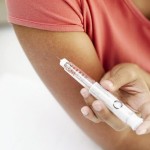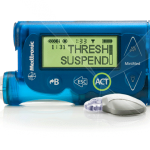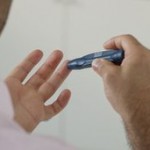Acidic Diet Tied to Diabetes Risk for Women

A diet high in acidic foods — meat, fish, and sodas, for instance — may put some women at greater risk for developing type 2 diabetes, researchers found.

A diet high in acidic foods — meat, fish, and sodas, for instance — may put some women at greater risk for developing type 2 diabetes, researchers found.

Here, we take a look at the facts and fiction about insulin when it comes to treating type 2 diabetes.

Babies born of women who have undergone bariatric (weight-loss) surgery are more likely to be premature and to be small for gestational age, according to a large registry study carried out at Karolinska Institutet in Sweden and published in the BMJ.

There are a lot of misconceptions surrounding every common disease, and type 2 diabetes is no different. Even patients with diabetes and their family members may be misinformed. Here are eight common myths associated with type 2 diabetes.

A hormone test may be able to predict the extent of metabolic improvement caused by the gastric bypass. These are the results of a study on a rodent model conducted by Prof. Dr. Matthias Tschöp and his colleagues from the Institute of Diabetes and Obesity (IDO).

“Many people think their number-one priority is to no longer let sugary foods and sweets pass their lips. That’s in part because diabetes has been synonymous with sugar through the ages,” says dietitian and diabetes educator Tami Ross, the 2013 president of the American Association of Diabetes Educators and co-author of “What Do I Eat […]

Maryland-based health technology company WellDoc says it has developed a mathematical model that eventually will allow people with type 2 diabetes to predict the onset of a hypoglycemic episode.

No differences were found in health status, well-being, quality of life, and treatment satisfaction between screen-detected type 2 diabetes patients receiving intensive treatment and those receiving routine care, a study reported.

The mocked “obesity excuse” of being born with a slow metabolism is actually true for some people, say researchers.

Check out this amazing infographic about diabetes and your eye health. Nobody likes to think about diabetes leading to blindness, but of course it can. For example, 32% of people didn’t know they even needed an eye exam, 36% heard about eye risks only upon diagnosis, and 22% never-ever had a doctor talk to them […]

Most people who receive bariatric surgery in Canada, and around the world, are obese women, even though their male counterparts are more at risk, especially if those men are smokers and have diabetes.

The American Diabetes Association (ADA) has released a new position statement on nutrition therapy for patients with diabetes. The last statement was published in 2008.

Sleep-disordered breathing and the daytime tiredness that comes with it are common in type 2 diabetes. In a subgroup analysis from a large observational study, researchers found that patients who had higher scores on two different scales of daytime sleepiness were significantly more likely to have suffered from severe hypoglycemia

A recent study from the University Group Diabetes Program (UDGP) reports that a drug often combined with metformin (also known as Glucophage) actually increases a person with type 2 diabetes’ risk of death.

Gastric bypass surgery resulted in significantly more weight loss and also improved measures of glycemic control significantly more than did other forms of bariatric surgery, Dr. John Morton reported at the annual clinical congress of the American College of Surgeons.

The American Diabetes Association recommends all people living with diabetes make nutrition therapy a part of their diabetes treatment plan, but emphasizes that there is no single eating pattern that is best for everyone, according to a position statement being published online Oct. 9 in Diabetes Care

Out of 27,009 Chinese participants ages 45 and older, about 70 percent reported taking naps regularly during the afternoon. Researchers found impaired fasting plasma glucose (IFG), commonly known as prediabetes, increased in a “dose-dependent” manner as naps increased in length. The increase in pre-diabetes was noted only in naps longer than 30 minutes

Here’s a look at a few type 2 drugs researchers are working on. Some are close to market while others will take a few years longer before they can pass tests that establish their marketability.

US Scientists have developed a simple scoring system (DiaRem), based on four readily available preoperative patient characteristics, that can predict which candidates for gastric bypass surgery are likely to achieve diabetes remission within 5 years.

“Brittle diabetes” does not refer to everyday ups and downs, but rather to a rare but real condition in which the PWD has volatile blood sugar swings that are nearly impossible to control.